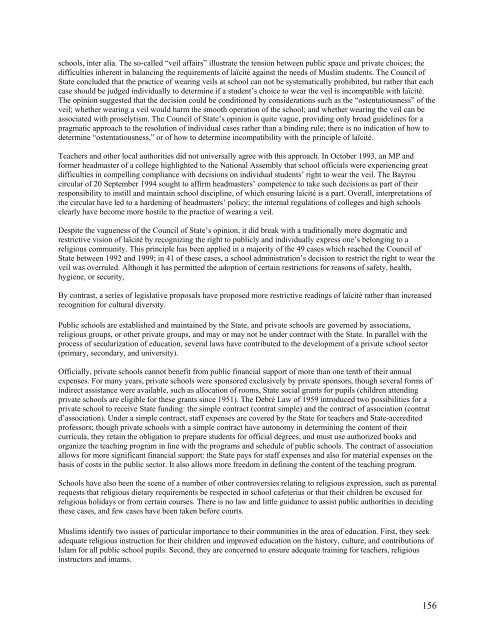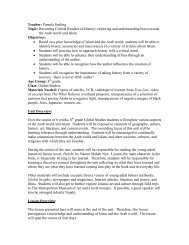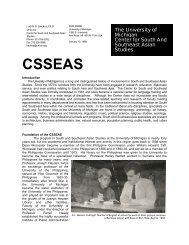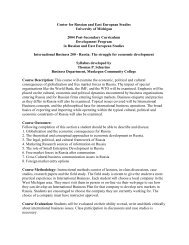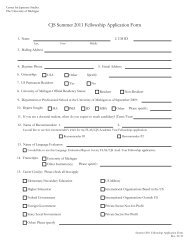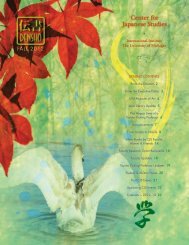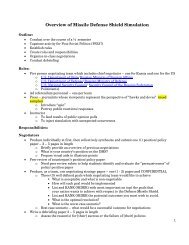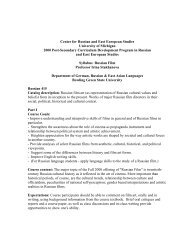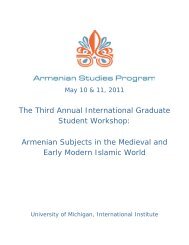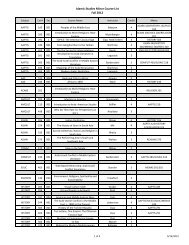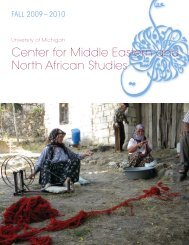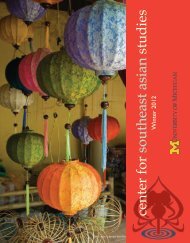Muslims in Europe: - International Institute - University of Michigan
Muslims in Europe: - International Institute - University of Michigan
Muslims in Europe: - International Institute - University of Michigan
Create successful ePaper yourself
Turn your PDF publications into a flip-book with our unique Google optimized e-Paper software.
schools, <strong>in</strong>ter alia. The so-called “veil affairs” illustrate the tension between public space and private choices; the<br />
difficulties <strong>in</strong>herent <strong>in</strong> balanc<strong>in</strong>g the requirements <strong>of</strong> laïcité aga<strong>in</strong>st the needs <strong>of</strong> Muslim students. The Council <strong>of</strong><br />
State concluded that the practice <strong>of</strong> wear<strong>in</strong>g veils at school can not be systematically prohibited, but rather that each<br />
case should be judged <strong>in</strong>dividually to determ<strong>in</strong>e if a student’s choice to wear the veil is <strong>in</strong>compatible with laïcité.<br />
The op<strong>in</strong>ion suggested that the decision could be conditioned by considerations such as the “ostentatiousness” <strong>of</strong> the<br />
veil; whether wear<strong>in</strong>g a veil would harm the smooth operation <strong>of</strong> the school; and whether wear<strong>in</strong>g the veil can be<br />
associated with proselytism. The Council <strong>of</strong> State’s op<strong>in</strong>ion is quite vague, provid<strong>in</strong>g only broad guidel<strong>in</strong>es for a<br />
pragmatic approach to the resolution <strong>of</strong> <strong>in</strong>dividual cases rather than a b<strong>in</strong>d<strong>in</strong>g rule; there is no <strong>in</strong>dication <strong>of</strong> how to<br />
determ<strong>in</strong>e “ostentatiousness,” or <strong>of</strong> how to determ<strong>in</strong>e <strong>in</strong>compatibility with the pr<strong>in</strong>ciple <strong>of</strong> laïcité.<br />
Teachers and other local authorities did not universally agree with this approach. In October 1993, an MP and<br />
former headmaster <strong>of</strong> a college highlighted to the National Assembly that school <strong>of</strong>ficials were experienc<strong>in</strong>g great<br />
difficulties <strong>in</strong> compell<strong>in</strong>g compliance with decisions on <strong>in</strong>dividual students’ right to wear the veil. The Bayrou<br />
circular <strong>of</strong> 20 September 1994 sought to affirm headmasters’ competence to take such decisions as part <strong>of</strong> their<br />
responsibility to <strong>in</strong>still and ma<strong>in</strong>ta<strong>in</strong> school discipl<strong>in</strong>e, <strong>of</strong> which ensur<strong>in</strong>g laïcité is a part. Overall, <strong>in</strong>terpretations <strong>of</strong><br />
the circular have led to a harden<strong>in</strong>g <strong>of</strong> headmasters’ policy; the <strong>in</strong>ternal regulations <strong>of</strong> colleges and high schools<br />
clearly have become more hostile to the practice <strong>of</strong> wear<strong>in</strong>g a veil.<br />
Despite the vagueness <strong>of</strong> the Council <strong>of</strong> State’s op<strong>in</strong>ion, it did break with a traditionally more dogmatic and<br />
restrictive vision <strong>of</strong> laïcité by recogniz<strong>in</strong>g the right to publicly and <strong>in</strong>dividually express one’s belong<strong>in</strong>g to a<br />
religious community. This pr<strong>in</strong>ciple has been applied <strong>in</strong> a majority <strong>of</strong> the 49 cases which reached the Council <strong>of</strong><br />
State between 1992 and 1999; <strong>in</strong> 41 <strong>of</strong> these cases, a school adm<strong>in</strong>istration’s decision to restrict the right to wear the<br />
veil was overruled. Although it has permitted the adoption <strong>of</strong> certa<strong>in</strong> restrictions for reasons <strong>of</strong> safety, health,<br />
hygiene, or security,<br />
By contrast, a series <strong>of</strong> legislative proposals have proposed more restrictive read<strong>in</strong>gs <strong>of</strong> laïcité rather than <strong>in</strong>creased<br />
recognition for cultural diversity.<br />
Public schools are established and ma<strong>in</strong>ta<strong>in</strong>ed by the State, and private schools are governed by associations,<br />
religious groups, or other private groups, and may or may not be under contract with the State. In parallel with the<br />
process <strong>of</strong> secularization <strong>of</strong> education, several laws have contributed to the development <strong>of</strong> a private school sector<br />
(primary, secondary, and university).<br />
Officially, private schools cannot benefit from public f<strong>in</strong>ancial support <strong>of</strong> more than one tenth <strong>of</strong> their annual<br />
expenses. For many years, private schools were sponsored exclusively by private sponsors, though several forms <strong>of</strong><br />
<strong>in</strong>direct assistance were available, such as allocation <strong>of</strong> rooms, State social grants for pupils (children attend<strong>in</strong>g<br />
private schools are eligible for these grants s<strong>in</strong>ce 1951). The Debré Law <strong>of</strong> 1959 <strong>in</strong>troduced two possibilities for a<br />
private school to receive State fund<strong>in</strong>g: the simple contract (contrat simple) and the contract <strong>of</strong> association (contrat<br />
d’association). Under a simple contract, staff expenses are covered by the State for teachers and State-accredited<br />
pr<strong>of</strong>essors; though private schools with a simple contract have autonomy <strong>in</strong> determ<strong>in</strong><strong>in</strong>g the content <strong>of</strong> their<br />
curricula, they reta<strong>in</strong> the obligation to prepare students for <strong>of</strong>ficial degrees, and must use authorized books and<br />
organize the teach<strong>in</strong>g program <strong>in</strong> l<strong>in</strong>e with the programs and schedule <strong>of</strong> public schools. The contract <strong>of</strong> association<br />
allows for more significant f<strong>in</strong>ancial support: the State pays for staff expenses and also for material expenses on the<br />
basis <strong>of</strong> costs <strong>in</strong> the public sector. It also allows more freedom <strong>in</strong> def<strong>in</strong><strong>in</strong>g the content <strong>of</strong> the teach<strong>in</strong>g program.<br />
Schools have also been the scene <strong>of</strong> a number <strong>of</strong> other controversies relat<strong>in</strong>g to religious expression, such as parental<br />
requests that religious dietary requirements be respected <strong>in</strong> school cafeterias or that their children be excused for<br />
religious holidays or from certa<strong>in</strong> courses. There is no law and little guidance to assist public authorities <strong>in</strong> decid<strong>in</strong>g<br />
these cases, and few cases have been taken before courts.<br />
<strong>Muslims</strong> identify two issues <strong>of</strong> particular importance to their communities <strong>in</strong> the area <strong>of</strong> education. First, they seek<br />
adequate religious <strong>in</strong>struction for their children and improved education on the history, culture, and contributions <strong>of</strong><br />
Islam for all public school pupils. Second, they are concerned to ensure adequate tra<strong>in</strong><strong>in</strong>g for teachers, religious<br />
<strong>in</strong>structors and imams.<br />
156


